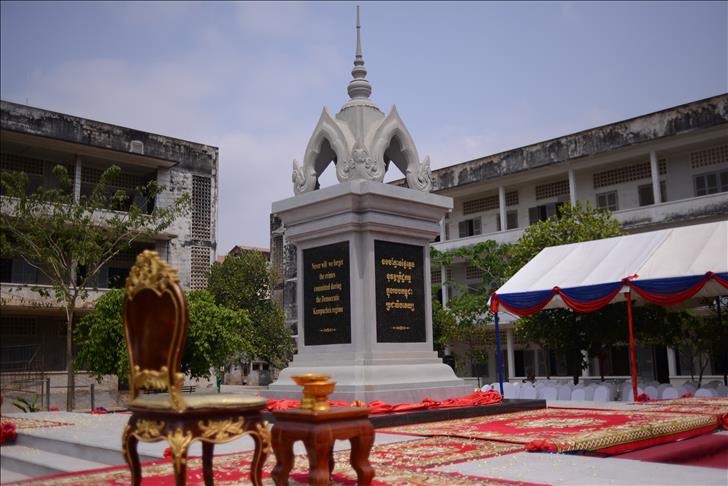
By Lauren Crothers
PHNOM PENH
A Muslim civil party witness to atrocities committed during Cambodia’s Khmer Rouge regime on Wednesday completed his testimony, but not before he put two unanswered questions to the two elderly defendants charged with genocide.
Sos Min, who first took to the stand Tuesday and described being forcibly evacuated from his village and sent on a rain-sodden journey during which several newborn babies died, was cross-examined by defence lawyers Wednesday.
Before leaving the court, he was given permission to ask former Khmer Rouge head of state Khieu Samphan and the regime’s "Brother Number 2," Nuon Chea—who observed proceedings from a holding cell, two questions about their involvement in the destruction of the Cham way of life.
“You two were leaders of the regime,” he said. “You made people undergo suffering—people were executed and killed, so what were the purposes of your regime?”
He then asked: “Why were all religions were abolished, including my Islamic religion? We Cham people were persecuted on a permanent basis during that time.”
Cham Muslims are the largest ethnic minority in Cambodia, but the charges before the court say that there was a systematic plan in place to mistreat, target and ultimately kill them. This included forcing them to eat pork, cut their hair and stand by as Qurans were seized and burned.
Unfortunately for Min, as both accused decided earlier this year they would be exercising their rights to remain silent in court, responses were not forthcoming.
“It is therefore incumbent upon them to inform the chamber in a timely and efficient manner, should they waive right to remain silent and be willing to respond to questions,” Trial Chamber President Nil Nonn told Min.
Next up was the first non-Cham witness to take the stand since hearings on genocide charges opened on Monday.
Ethnic Khmer witness Seng Kuoy told prosecutors that he observed Cham people in neighbouring villages being forced to abandon their religion, after which they were essentially “merged with the Khmer people.”
His role in providing testimony became clearer when questioning turned to an incident that happened one night in 1977, when he and his fellow villagers, which included about 15 Cham women and children, were eating communally.
“That night, security forces came to arrest the Cham people. They arrested all the Cham living in Village 2. I was there.”
The detainees’ hands were tied behind their backs and then Kuoy was ordered by a Khmer Rouge cadre to deposit them at the gates of a Buddhist pagoda that had been turned into one of the regime’s notorious security centres.
“I received an order to drive those people on the ox cart. I didn’t dare refuse—I would have been taken away and killed, along with the Cham people. They issued an order to me, and I had to follow it. Drove them to a pagoda. Since that time, I have never seen those Cham people, even a single one, again,” he testified.
“The arrested Cham people were innocent, they didn’t do anything wrong and strove to work very hard.”
Hearings continue Thursday.
Anadolu Agency website contains only a portion of the news stories offered to subscribers in the AA News Broadcasting System (HAS), and in summarized form. Please contact us for subscription options.

